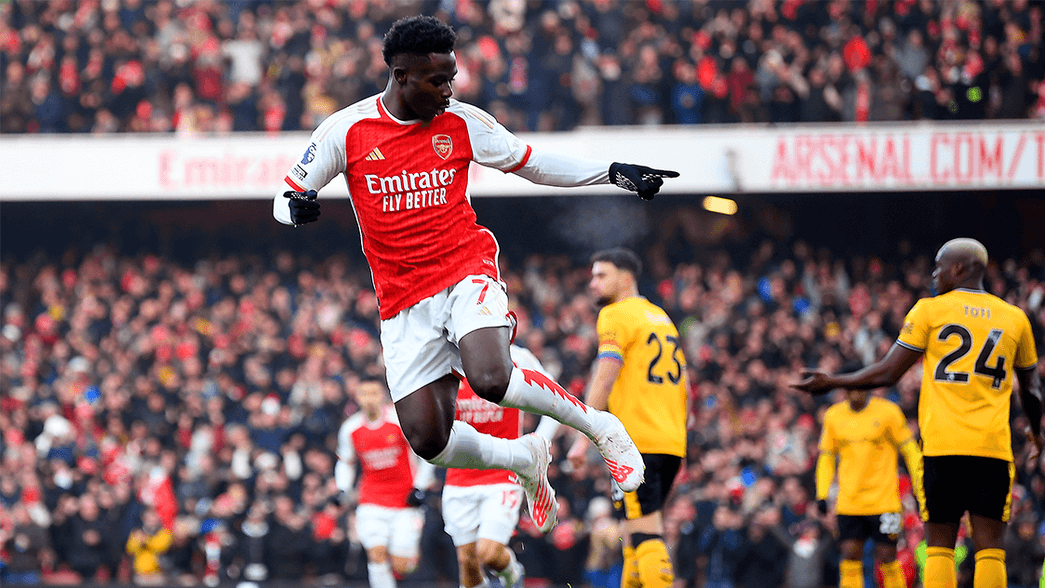We extended our lead at the top of the table by beating Wolves 2-1 at Emirates Stadium thanks to goals from Bukayo Saka and Martin Odegaard, but who else caught the eye?
Adrian Clarke has delved into the stats and rewatched the action to uncover just how we were able to claim the victory - here are his findings:
Fast start reaps rewards
Mikel Arteta’s side made a habit of tearing into opponents right from the kick-off last season, but this was the first time we had scored inside the opening 15 minutes of a Premier League match in 2023/24.
Early strikes from Bukayo Saka and Martin Odegaard set the tone and put us in full control, and the tempo of our football could not have been more assertive in the first half hour.
Moving the ball quickly and with confidence, we produced a level of sustained pressure that left Wolves with little choice but to play on the back foot. Gary O’Neil’s side only made it into our defensive third twice in the opening half hour, which outlines the measured control the Gunners had.
| Opening 30mins | Arsenal | Wolves |
| Goals | 2 | 0 |
| Shots | 6 | 0 |
| Shots on target | 3 | 0 |
| Touch in opp box | 15 | 0 |
| Final third entries | 38 | 2 |
Scoring the opening goal is of huge significance, especially for this Arsenal side. Since the start of last season in the Premier League we have a record of 30 wins, five draws and no defeats after going 1-0 up. Our average points tally this season is 2.8 per match after taking the lead, so quick starts are a habit we would like to continue.
Odegaard takes centre stage
Martin Odegaard was Arsenal’s star performer in this victory. Our captain made the highest number of passes (88) with the majority of them (52) inside the final third. The Norwegian also created more chances than anybody else (6) and found the back of the net with a lovely left-footed finish.
He could also easily have added two excellent assists inside the final 10 minutes.
From a terrific turnover created by Kai Havertz, he threaded Leandro Trossard in behind with a classy ‘lollipop’ stepover and nutmeg pass that put the Belgian in the clear.

Then, just a few minutes later after receiving a pass inside the centre circle, Odegaard ran unopposed down the spine of the field before releasing Eddie Nketiah for a 1v1 with an outside of the foot through ball.
His timing was exquisite on both occasions, and Wolves were fortunate that neither pass was punished with a goal.

Full-backs mirroring each other
It was fantastic to see both our starting full-backs, Takehiro Tomiyasu and Oleksandr Zinchenko, provide their first Premier League assists of the season.
The build-up to our second goal was a standout move involving a delightful 1-2 between Zinchenko and Gabriel Jesus, before the Ukrainian fizzed a perfect cutback into the path of the onrushing Odegaard.
From a tactical perspective it was interesting to see slightly different positioning from our left and right backs. With the visitors clogging up that central region with three central midfielders (and a front two) neither man ventured as far infield as normal, instead choosing to step inside 10-15 yards for the bulk of their touches.
These semi-inverted positions either pulled a wing-back inside, or a central midfielder slightly wider, opening up space for teammates elsewhere.
Successful passes: Zinchenko & Tomiyasu

From those areas Tomiyasu picked out Saka with 23 passes, with Zinchenko finding Gabriel Martinelli on 20 occasions. As shown on the chalkboard our two full-backs practically mirrored one another with their distribution patterns.
Trossard shows his other side
The manager opted to start Trossard as his left-sided No.8 for this clash and the versatile 28-year-old impressed.
His runs into the box from deep were intelligent and well-timed, and during the match he registered a team-high five shots, proving he can still be a goal threat from that deeper position.
The way that Odegaard looked for his runs into the danger zone was particularly encouraging. Three of the ten passes he fed to Trossard arrived at his feet inside the area.
This audition from Trossard also showed how industrious he can be out of possession. No one in an Arsenal recovered the ball as often as he did with 10 regains, 3 interceptions and 2 tackles won (green).
The bulk of those defensive contributions occurred within a 10-yard corridor either side of the halfway line.

Dominant display

While it was disappointing to concede a late goal that made the final few minutes tense inside Emirates Stadium, this remained a comfortable win. Our 14 shots from inside the box was the second-highest tally we have produced this campaign, with our 2.89 xG our third best to date.
O’Neil’s team have had more shots from fast breaks than any other top-flight side but pleasingly they offered very little threat from counters. In fact, they failed to have a single shot from a breakaway for just the second time this season.
If you discount their loss at Fulham last week – a game that featured two penalty kicks - this was also a match that saw Wolverhampton Wanderers taste their highest expected goals against (xGA) figure of the campaign so far.
While it was our explosive start that ultimately won us the match, we efficiently controlled the bulk of what could have been a dangerous fixture. Arteta described his team’s performance as ‘excellent’ and I would have to agree.
Have a go at your own analysis by digging deeper into the numbers or building your own chalkboard with our revamped Stats Centre
Copyright 2024 The Arsenal Football Club Limited. Permission to use quotations from this article is granted subject to appropriate credit being given to www.arsenal.com as the source.










